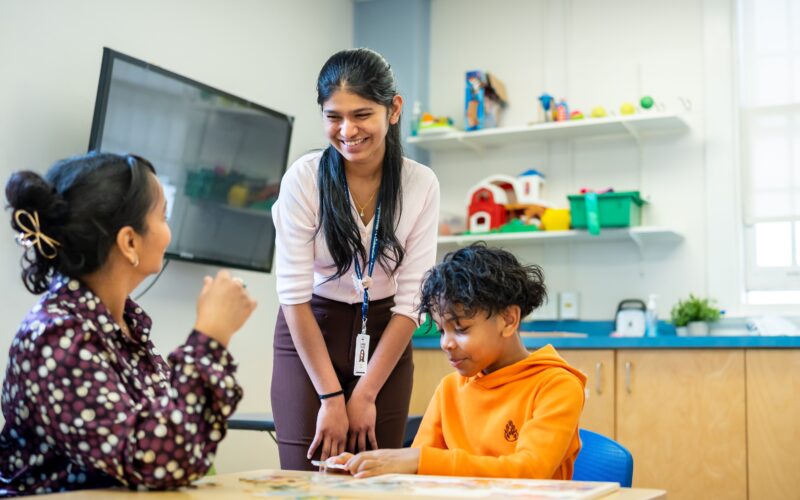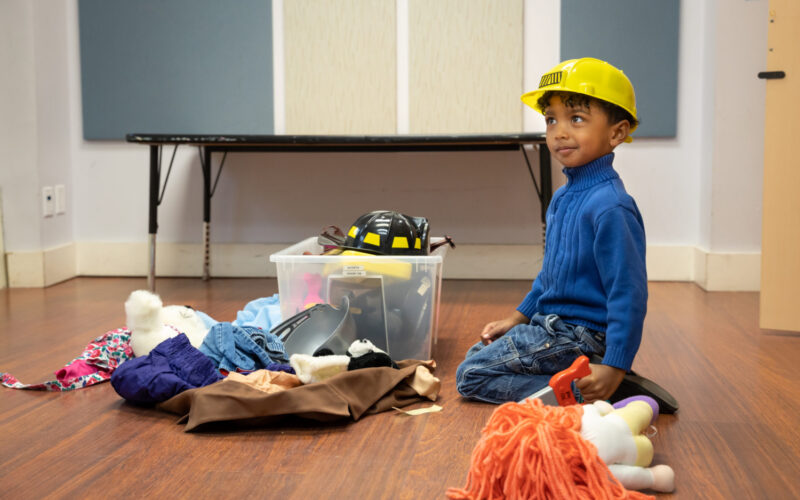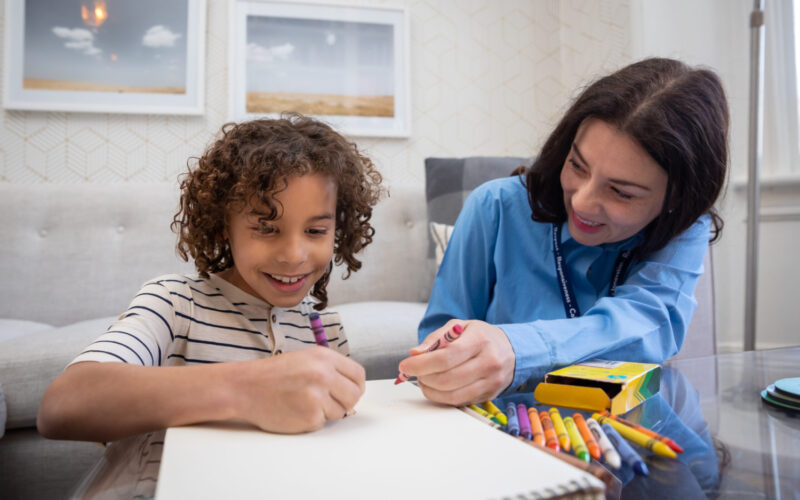Whether you have sought out Urgent Response Services (URS) on your own or a teacher, doctor or social worker referred you, you probably have a lot of questions. Some of the things you may be wondering include how the service works, how eligibility is determined, and what you can expect from the program. This article provides answers to those questions and more.
Who are Urgent Response Services for?
The Urgent Response Services are for families and caregivers who are experiencing a spike in their child’s challenging behaviour. The program is designed to target one specific behavioural challenge over a short period of time (up to 12 weeks). A multidisciplinary team of URS professionals is assembled based on the behaviour that needs to be addressed. Because URS is a short-term service, it isn’t intended to address long-standing behaviours, but rather a specific behaviour that has been escalating.
The program’s intent is to teach you skills to manage your child’s challenging behaviours on your own, so you have the tools you need once the program ends. This means your active involvement in the program is essential.
It’s important to understand that URS is not:
- A crisis service (URS doesn’t replace ambulatory services or a 24-hour crisis line)
- Direct therapy for your child (you do not drop off your child at Surrey Place for treatment)
- A respite program (respite services are available, but this is only one part of the program)
Urgent Response Services have three goals:
- To stabilize your child’s behaviour and prevent a risk of harm to other people, property, or your child (self-harm)
- To help you learn how to manage your child’s challenging behaviour on your own
- To ensure you and your family are coping well at home
How does the process work?
- Intake: Your first point of contact will be with the URS intake team, who will ask about your family’s priorities and what kind of services you’re looking for.
The intake team will determine whether your family is eligible for URS using the CANS (Child and Adolescent Needs and Strengths) assessment tool, developed specifically for URS. The CANS assessment allows the intake team to determine if your child’s challenging behaviour meets the threshold for treatment in URS. Using the CANS, each type of behaviour is evaluated and rated separately to determine eligibility.
In addition to the CANS rating, you must also meet other criteria:
- Your child must be under 18 years old
- You must be registered through the Ontario Autism Program (OAP), which provides funding and services for children under 18 years of age with autism, along with their families and caregivers
- Your child’s behaviour must have escalated in the 14 days prior to the referral to URS
- You need to be willing to act as a mediator for your child and learn how to carry out their behaviour plan
- The behaviour needs to be occurring in an environment where you are with your child – typically within the home (as opposed to school, where you – or another mediator – is not present with your child)
The behaviour needs to be occurring in an environment where you are with your child – typically within the home (as opposed to school, where you – or another mediator – is not present with your child)
- Service coordination: If your family is eligible for URS, a service coordinator will meet with your family within five business days. Your service coordinator will get to know your family, acting as your voice during your time in URS. You can expect your service coordinator to:
- Explain how URS works, including what kind of involvement will be required from you
- Gather all relevant information about your child, including school and medical information and other reports that may be helpful for the clinical team
- Work with you to identify which behaviour to target
- Bring in any other services or supports your family needs (like a behaviour therapist, social worker or respite services)
- Work with you and your team to implement the plan after you agree to it
- Planning: Your service coordinator will start by having a planning meeting with the team of professionals that will be supporting your family. In this meeting, they will share all the information they have gathered and determine the level of support that will best meet your family’s needs. Next, a multidisciplinary team will develop a plan that your service coordinator will share with you. If your family agrees to the plan, clinical services will begin.
- Meeting with the clinical team: The team assembled to support your family will gather detailed information about the specific behaviour they are trying to address. Some of the questions you can expect to be asked during your first meeting include:
- What does the challenging behaviour look like? For example, if the behaviour is aggression, does it involve kicking, hitting or punching?
- How often does the behaviour occur?
- When does it usually happen?
- Why do you think the behaviour happens?
- What happens immediately before and after the behaviour?
You should also be prepared to share other relevant information in the first meeting with your support team, including any changes in your child’s medication and recommendations that other professionals have made (like having your child wear a helmet). Consider filming the behaviour you want to address in URS. This will help the support team get a better understanding of what is happening.
Based on the information the team gathers, they will try to determine why the behaviour is happening and what has caused an escalation in the behaviour.
Who will be on my support team?
Your support team will always include a service coordinator who will guide you through the URS process from start to finish. Beyond this, the team is individualized based on your family’s needs. Most teams will include a Board-Certified Behaviour Therapist. Your team might also include a social worker, respite services and an occupational therapist, along with other professionals.
Keep in mind that as a parent or caregiver, you are also an essential member of your child’s support team.
What is the mediator model?
Through Urgent Response Services, you will receive training on how to be a mediator for your child. The idea of the mediator model is to teach strategies and provide skills training to the person who spends the most time with the child. Your child will have the greatest chance of success when the people they have the strongest relationship with (you and other family members or caregivers) are consistently reinforcing new skills.
When you have finished your training in the mediator model, a transition plan is put in place. This is to ensure you have all the tools and strategies to be able to continue skills training at home with your child.
Learn more about the mediator model.
How fast will I see progress?
You are probably wondering how long it will take before you begin to see positive behaviour changes in your child. The effectiveness of the behaviour plan depends on your family’s individual circumstances, so there is no universal answer to this question. Your readiness and participation as a mediator will also impact how soon you may begin to see changes in behaviour.
When it comes to other program milestones, here’s what you can expect:
- At around four weeks: You can expect to have a safety plan and behaviour plan in place for your child.
- At around six weeks: You will have an interim meeting with your support team to assess how your family is coping. Your support team will ask you questions about whether your child’s behaviour is stabilizing and how you’re doing with managing the behaviour at home.
- At around six weeks: The support team will start reducing the number of times they visit the home. The expectation is that by this point you will have the skills to be able to carry out the behaviour plan on your own.
What happens when my time in URS ends?
At the end of the program, you will receive a service summary report put together by your multidisciplinary team. It will summarize everything from your time in URS. This includes the behaviour plan for your child, any referrals (for other services), and any additional recommendations from your service coordinator.
During your time in URS you will also be connected to appropriate services to make sure you continue to have support when the program ends. This could include Surrey Place’s funded or paid services, respite services or free wellness services.
How Surrey Place can help
If you are a caregiver with a child who exhibits high-risk behaviours that require an urgent response, like violent thinking, aggression, or property destruction, you may be eligible for Surrey Place’s Urgent Response Services. This program, which is up to 12 weeks long, can be accessed through the Ontario Autism Program (OAP). The OAP provides funding and services for children and youth under 18 years of age with autism, along with their families and caregivers.
Who we are
Urgent Response Services are part of the Ontario Autism Program. They were created to support children or youth with an emerging urgent need. Surrey Place leads Urgent Response Services for Toronto Region in partnership with 2-Spirited People of the 1st Nations, Community Living Toronto, Family Service Toronto, Geneva Centre, Holland Bloorview, Kerry’s Place, Lumenus, SAAAC, SMILE Canada and Strides Toronto.
For support for a child with autism spectrum disorder whose needs are not urgent, please visit Surrey Place’s Autism Services page.


